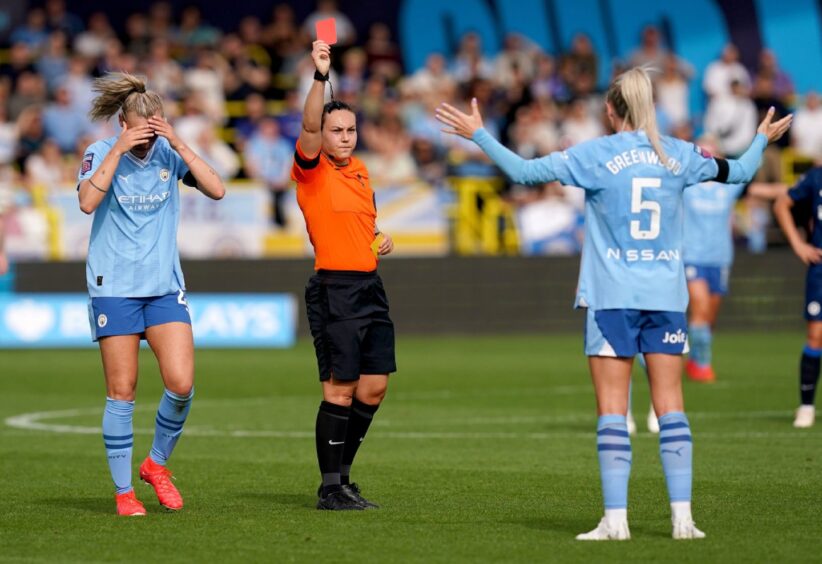The spotlight has been on refereeing standards in women’s football this week, following the controversial dismissal of Manchester City captain Alex Greenwood in their 1-1 FA Women’s Super League draw with Chelsea.
In the 38th-minute, and with City 1-0 up, defender Greenwood was shown a second yellow card by referee Emily Heaslip, who deemed her guilty of time-wasting as she prepared to take a free-kick.
We were watching the game on the Aston Villa team bus, and given fewer than 30 seconds had elapsed between the free-kick being awarded and Greenwood striking the ball, I think in this instance the referee was too harsh. I don’t think the England star was trying to waste time.
However, the ref’s ruling reflects what has been a drive by officials to be stricter across both the men’s and women’s top-flights south of the border this season.
And I am in favour of their clampdown on certain behaviours.
Before the WSL season started, coaches and players – myself and my team-mates at Villa included – received a visit from the referees, who made clear they would be taking aim at both dissent and time-wasting during the 2023/24 campaign.
Officials in the WSL had been criticised in previous seasons for being too lenient. But the City game last weekend broke the league record for the most cautions in a game, several dissent-related. There has also been a clear uptick in red cards in the opening weeks of the 2023/24 WSL term.
Although there will be mistakes and teething problems where refs are too officious in targeting certain perceived infractions, like on Sunday, I am broadly behind efforts to tackle the various forms of dissent and aggression towards officials, as well as time-wasting.
I don’t necessary think there has been a particular problem with those behaviours in the women’s game, but they are undoubtedly an issue across the board, and you want refereeing approaches across the men’s and women’s games to be the same.
I feel it is really important dissent and players’ demeanour towards officials generally is strictly controlled.
In the games I play in, there’s generally always a decent level of respect shown.
However, bad behaviour on the field from players and coaches towards referees and their assistants sends a message to fans it is ok to abuse officials, which it isn’t.
Anyone who has been to a football match – men’s or women’s – will have seen unacceptable language directed towards a referee, linesman or other official from the stands, and clubs have a role in stopping this.
It is socially responsible to keep any disrespect on the pitch to a minimum and for coaches and players to send the message officials are trying to referee the game as best they can, but mistakes will happen and decisions will go against you, sometimes unfairly, from time to time.
Obviously the Greenwood incident centered on the simultaneously-tightened approach to acts deemed to be time-wasting, rather than abuse.
Again, I can see the benefit of this to the game – especially to paying supporters.
Football is an entertainment industry, and we want the ball to be in play – what everyone is there to see ultimately – as much as possible. And we don’t want it to be in the keeper’s hands, or to be left waiting for a set-piece to be taken, for any longer than is necessary.
By clamping down on delaying tactics, as well as adding on every second of time wasted as stoppages at the end of each half, teams will hopefully get the message, with the average game being faster-paced and more entertaining as a result.
City and Greenwood will feel they have, somewhat unjustly, been made an example of, but it will be interesting to see how the situation with yellow and red cards stemming from both time-wasting and dissent develops in the weeks and months ahead.
Will players and coaches across the league adapt their behaviour, having witnessed just how zero-tolerance the approach from some officials might be?
Glasgow City’s Champions League qualifier thumping should be wake-up call to SWPL clubs
Glasgow City’s Champions League second qualifying round first leg hammering at home to Brann was a blow for the Scottish game as a whole.
My former side now look set to miss out on the UWCL group stage once again.
Brann are much further into their domestic season than City, with the Norwegian league due to finish in November. However, they are fourth in the Toppserien and it was a surprise to see the Scottish champions outclassed in the way they were.
It must be a bit of a reality check and wake-up call for the SWPL clubs about the need to continue pushing their standards.
I didn’t think Brann was an easy draw or would be pushovers, but it looked like a good chance on paper to get through, and you would have expected tighter margins than City being 2-0 down after quarter of an hour in the first leg.
What are our standards now compared to other similar-sized nations?
We don’t want to be left behind, going years without any of our teams competing in the premier European competition proper, and in the last few years we’ve also seen City lose qualifiers against Swiss side Servette and Rangers defeated by Benfica.
I don’t think the Scottish sides were favourites for those ties, by any means, but those rivals should not represent insurmountable opposition either.
It’s a real disappointment we won’t see a Scottish team taking on some of the giants of European football in the group stage this season – unless there is an almighty City comeback.
Under the previous format of the competition, City twice reached the quarter-finals, with a smaller budget and less infrastructure than they, Rangers or Celtic have now (although women’s programmes across the Continent will have seen similar growth).
Financially, for City specifically, missing out on the groups will hit their budget going forward, and the lack of prize money may see the gap between them and other European sides grow.
They will be looking to return to winning ways in their trip to Aberdeen this weekend.
After three comprehensive defeats to big-hitters Celtic and Hibs (twice – once in the SWPL Cup), the Dons suffered a disappointing away SWPL reverse at Dundee United last Sunday, where they got themselves level at 1-1 after the break before quickly conceding again in an eventual 3-2 loss.
It now feels like Clint Lancaster’s side are at risk of a bit of a slump, and are suffering from a little bit of inconsistency brought on by a couple of big injuries and due to their relatively young, inexperienced (and small) squad.
I think against City, if they can stay in the game, building a bit of confidence by being watertight at the back for prolonged spells, it would renew their self-belief and be a good foundation from which the Reds can start picking up results again.





Conversation